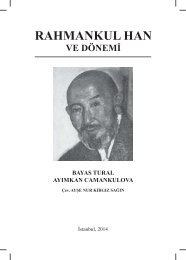THE SOVIET HISTORIOGRAPHY AND THE QUESTION OF KAZAKHSTAN’S HISTORY
SOVYET-TARIH-YAZICILIGI-ENG
SOVYET-TARIH-YAZICILIGI-ENG
You also want an ePaper? Increase the reach of your titles
YUMPU automatically turns print PDFs into web optimized ePapers that Google loves.
<strong>THE</strong> <strong>QUESTION</strong> <strong>OF</strong> <strong>KAZAKHSTAN’S</strong> <strong>HISTORY</strong> 203<br />
of the Tatar nation was evaluated. In a way satisfying the Soviet<br />
government, it was claimed that Kazan Tatars had no links with the<br />
Tatars of Golden Horde and Kazan Khanates. The Soviet ethnographers<br />
announced that the Turkish community of the Volga-Ural region hailed<br />
from Volga Bulgarians and adopted Kipchaks only in linguistic terms.<br />
As Allen J. Frank asserts, the Soviet government ironically reinvented<br />
the “Bulgarian” imagination that they had desirably abolished some<br />
years before for their very own purposes. 387<br />
In the recollection named Historical Materials for the History of Tatar<br />
SSR published in 1948, Tatar history was reinterpreted. This officially<br />
approved narration subsequently formed the basis of the history course<br />
books’ content. The history of the Tatars would be depicted anymore<br />
as: “Originally descending from the Volga Bulgarians, the Kazan Tatars<br />
were squeezed under the oppression of the brutal Mongol-Tatar khans<br />
during the Golden Horde and Kazan Khanate periods. They were only<br />
spared after the conquest of Kazan by the forces of Ivan the Terrible.<br />
Then, they fought against the barbarian Tatar khans alongside their<br />
Russian comrades. The Russian control that replaced the Kazan Khanate<br />
brought about peace and welfare to the region. Especially after the<br />
consolidation of Soviet authority, the Kazan Tatars suffering from ignorance<br />
and poverty at last revived and attained civilized life”. From then<br />
on, the history of Tatars would be told in this way – that is, extremely<br />
shorn and falsified – till the end of the Soviet period.<br />
We have to stress that the “Tatar” ethnic name got a negative<br />
meaning as a result of the descriptions such as “Mongol-Tatar yoke”,<br />
“parasitic looter Tatar Khans” and negative depictions. This fact unsurprisingly<br />
created negative social consequences. While the members<br />
of other nations scorned and ridiculed the “Tatar” individuals, the<br />
Tatars exposed to these insults felt ashamed of their social identity<br />
from their infancy. Therefore, the Tatars were obliged to live with this<br />
shame and to hate their pasts and even their names.<br />
Tatar intellectuals disturbed of this situation engaged in activities<br />
to protect the historical legacy and Tatar identity on every occasion.<br />
Especially after 1960s, they caught certain chances. The ideological<br />
atmosphere softened after the death of Stalin opened some positive<br />
grounds in Tatar intellectual life and historiography. In 1960s and 1970s,<br />
some Tatar intellectuals initiated the “Respect to legacy” movement.<br />
In this prospect, the problems of mother tongue, education, science,<br />
culture and historiography that the Tatars suffered were highlighted.<br />
Though with certain precautions, some Tatar historians slowly began<br />
387 Frank, ibid, p. 179.



